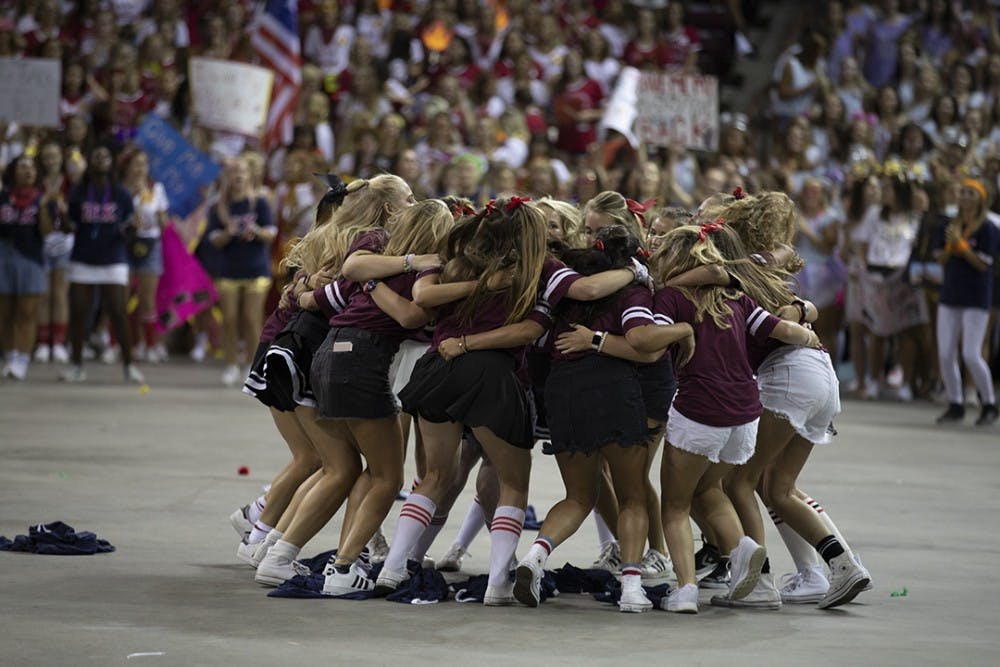The rich tradition of sororities and fraternities on USC’s campus continues as over a quarter of the student population finds a home in a Greek organization and many more become involved in the recruitment process.
The 19 sororities and 28 fraternities on USC's campus are divided among four Greek organizations — College Panhellenic Association (CPA), Interfraternity Council (IFC), National Pan-hellenic Council (NPHC) and Multicultural Greek Council (MGC). CPA and IFC are the only two organizations whose homes are in Greek Village, and they are the larger of the four, with approximately 4,275 female students and 2,134 male students.
“Currently, Fraternity & Sorority Life offers that experience for close to 27% of undergraduate students at USC inclusive of a multitude of backgrounds and experiences,” said Anna Edwards, associate vice president for Student Life. “We encourage students of all backgrounds to learn about and participate in various recruitment & membership intake opportunities should they be interested.”
For people like second-year middle-level education student Janee Wright, Greek life is a way to find a home on campus
“I wanted to do something different and get involved more with the campus and just Greek life had everything that I was looking for — community service, community, all types of aspects,” she said.
The reputations of CPA chapters continue to draw young women in, regardless of backgrounds or race. First-year business student Nikita Anand is the first person in her family to pursue an undergraduate degree in America. In order to make the growing campus of USC smaller, she chose to rush a CPA. Anand hopes to find her home in Pi Beta Phi or Alpha Gamma Delta at Bid Day.
“I think I follow a couple of the chapters on Instagram and I saw their recruitment was starting and I was like 'these girls look like they’re loving this chapter and they're having so much fun and doing it for a good cause',” Anand said.
The MGC and NPHC sororities and fraternities are considerably smaller than many individual chapters in CPA and IFC. NPHC is known to be the home of “nine historically Black Greek-letter fraternities and sororities” according to the Guide to Sorority and Fraternity Life. USC's student population is approximately 10.2 percent African-American and 20 percent minority overall, but NPHC was home to just 229 members total in 2017 while MGC had only 33, according to a USC report.
“The National Pan-Hellenic Council and Multicultural Greek Council help to promote and create inter-Greek relationships, implement programs to help meet the needs of the respective communities, and encourage and promote cultural diversity amongst the membership,” Edwards said.
NPHC and MGC are meant to help minorities at USC find commonalities while embracing service and community. While NPHC has grown tremendously since 2015 when there were 139 members, MGC has dropped from 54 members in spring of 2016. The Office of Student Life is attempting to let all students know about the opportunities in all four organizations of Greek Life so that everyone can find their unique home at USC.
“We invite all students to take part in the membership intake and recruitment processes, if fraternity and sorority membership is what a student desires,” Edwards said. “What organizations students choose to join are usually reflective of a multitude of personal choices in finding a connection with that organization and its overall mission.”
Despite attempts to foster community in the more diverse sororities and fraternities, some students say the level of involvement of some NPHC and MGC chapters deterred them from the membership intake process. Wright chose to rush in the College Panhellenic Association instead of the National Panhellenic Council and hopes to find her home in Alpha Delta Pi or Alpha Chi Omega.
“I just feel like they're more involved,” Wright said. “Nothing against the NPHC but I just feel … I feel like I’ll be more involved in CPA than in other organizations.”
Despite Greek Life being spread across four organizations, students find community they do not find anywhere else in their chosen chapter. Almost every chapter is involved in philanthropy, service, leadership and outside organizations and clubs. Students such as Wright and Anand say the recruitment process has made them feel welcomed and accepted.
“It’s been actually really good ... I don’t stick out because I’m a girl of color,” Wright said. “It’s just a really great process.”

